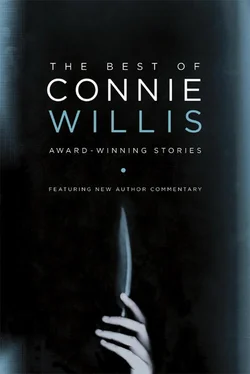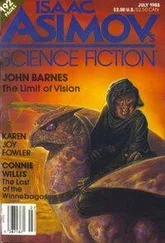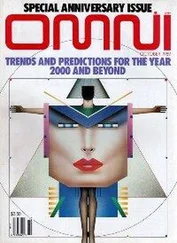“What do you want me to do?” Kildy asked.
“I want you to go through the transcripts like you suggested and find out where the quotes came from so we’ll know the particular works we’re dealing with,” I told her. “And I want you to talk to your publicist and anybody else who’s been to the seminars and find out if any of them had a private enlightenment audience with Ariaura. I want to know what goes on in them. Is she using Mencken for some purpose we don’t know about? See if you can find out.”
“I could ask Riata to get an audience,” she suggested.
“That’s a good idea,” I said.
“What about questions? Do you want me to try to come up with some harder ones than the ones we asked him—I mean, her?”
I shook my head. “Asking harder questions won’t help. If she’s got a photographic memory, she’ll know anything we throw at her, and if she doesn’t, and we ask her some obscure question about one of the reporters Mencken worked with at the Morning Herald , or one of his Smart Set essays, she can say she doesn’t remember, and it won’t prove anything. If you asked me what was in articles I wrote for The Jaundiced Eye five years ago, I couldn’t remember, either.”
“I’m not talking about facts and figures, Rob,” Kildy said. “I’m talking about the kinds of things people don’t forget, like the first time Mencken met Sara.”
I thought of the first time I met Kildy, looking up from my desk to see her standing there, with her honey-blond hair and that movie-star smile. “Unforgettable” was the word, all right.
“Or how his mother died,” Kildy was saying, “or how he found out about the Baltimore fire. The paper called him and woke him out of a sound sleep. There’s no way you could forget that, or the name of a dog you had as a kid, or the nickname the other kids called you in grade school.”
Nickname. That triggered something. Something Ariaura wouldn’t know. About a baby. Had Mencken had a nickname when he was a baby? No, that wasn’t it—
“Or what he got for Christmas when he was ten,” Kildy said. “We need to find a question Mencken would absolutely know the answer to, and if he doesn’t, it proves it’s Ariaura.”
“And if he does, it still doesn’t prove it’s Mencken. Right?”
“I’ll go talk to Riata about getting a private audience,” she said, stuffed the transcripts in her tote, and put on her sunglasses. “And I’ll pick up the videotape. I’ll see you tomorrow morning.”
“Right, Kildy?” I insisted.
“Right,” she said, her hand on the door. “I guess.”
In the highest confidence there is always a flavor of doubt—a feeling, half instinctive and half logical, that, after all, the scoundrel may have something up his sleeve.
—H. L. MENCKEN
After Kildy left, I called up a computer-hacker friend of mine and put him to work on the problem and then phoned a guy I knew in the English department at UCLA.
“Inquiries about Mencken?” he said. “Not that I know of, Rob. You might try the journalism department.”
The guy at the journalism department said, “Who?” and, when I explained, suggested I call Johns Hopkins in Baltimore.
And what had I been thinking? Kildy said Ariaura had started doing Mencken in Seattle. I needed to be checking there, or in Salem or—where had she gone after that? Sedona. I spent the rest of the day (and evening) calling bookstores and reference librarians in all three places. Five of them responded “Who?” and all of them asked me how to spell “Mencken,” which might or might not mean they hadn’t heard the name lately, and only seven of the thirty bookstores stocked any books on him. Half of those were the latest Mencken biography, which for an excited moment I thought might have answered the question, “Why Mencken?”—the title of it was Skeptic and Prophet— but it had only been out two weeks. None of the bookstores could give me any information on orders or recent purchases, and the public libraries couldn’t give me any information at all.
I tried their electronic card catalogues, but they only showed currently checked-out books. I called up the L.A. Public Library’s catalogue. It showed four Mencken titles checked out, all from the Beverly Hills branch.
“Which looks promising,” I told Kildy when she came in the next morning.
“No, it doesn’t,” she said. “I’m the one who checked them out, to compare the transcripts against.” She pulled a sheaf of papers out of her designer tote. “I need to talk to you about the transcripts. I found something interesting. I know,” she said, anticipating my objection, “you said all it proved was that Ariaura—”
“Or whoever’s feeding this stuff to her.”
She acknowledged that with a nod. “—all it proved was that whoever was doing it was reading Mencken, and I agree, but you’d expect her to quote him back verbatim, wouldn’t you?”
“Yes,” I said, thinking of Randall Mars’s Lincoln and his “Four score and seven…”
“But she doesn’t. Look, here’s what she said when we asked him about William Jennings Bryan: ‘Bryan! I don’t even want to hear that mangy old mountebank’s name mentioned. That scoundrel had a malignant hatred of science and sense.’”
“And he didn’t say that?”
“Yes and no. Mencken called him a ‘walking malignancy’ and said he was ‘mangy and flea-bitten’ and had ‘an almost pathological hatred of all learning.’ And the rest of the answers, and the things she said at the seminars, are like that, too.”
“So she mixed and matched his phrases,” I said, but what she’d found was disturbing. Someone trying to pull off an impersonation would stick to the script, since any deviations from Mencken’s actual words could be used as proof it wasn’t him.
And the annotated list Kildy handed me was troubling in another way. The phrases hadn’t been taken from one or two sources. They were from all over the map—“complete hooey” from Minority Report , “buncombe” from The New Republic , “as truthful as Lydia Pinkham’s Vegetable Compound” from an article on pedagogy in the Sun.
“Could they all have been in a Mencken biography?”
She shook her head. “I checked. I found a couple of sources that had several of them, but no one source that had them all.”
“That doesn’t mean there isn’t one,” I said, and changed the subject. “Was your friend able to get a private audience with Ariaura?”
“Yes,” she said, glancing at her watch. “I have to go meet her in a few minutes. She also got tickets to the seminar Saturday. They didn’t cancel it like I thought they would, but they did cancel a local radio interview she was supposed to do last night and the weeklong spiritual immersion she had scheduled for next week.”
“Did Riata give you the recording of Ariaura’s last seminar?”
“No, she’d left it at home. She said she’d bring it when we meet before her private audience. She said she got some really good footage of the emcee. She swears from the way he looked that he’s not in on the scam. And there’s something else. I called Judy Helzberg, who goes to every psychic event there is. Remember? I interviewed her when we did the piece on shamanic astrologers. And she said Ariaura called her and asked her for Wilson Amboy’s number.”
“Wilson Amboy?”
“Beverly Hills psychiatrist.”
“It’s all part of the illusion,” I said, but even I sounded a little doubtful. It was an awfully good deception for a third-rate channeler like Ariaura.
There’s somebody else in on it, I thought, and not just somebody feeding her answers. A partner. A mastermind.
After Kildy left I called Marty Rumboldt and asked him if Ariaura had had a partner in Salem. “Not that I know of,” he said. “Prentiss just did a study on witchcraft in Salem. She might know somebody who would know. Hang on. Hey, Prentiss!” I could hear him call. “Jamie!”
Читать дальше












